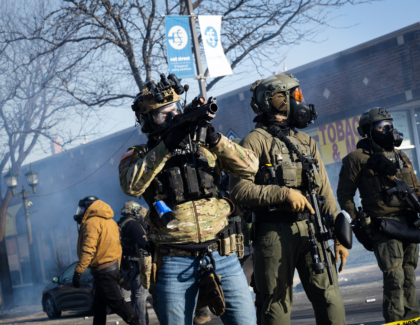Sign up for the daily CJR newsletter.
As we pointed out back in March, the media have been of two minds when it comes to the matter of who to label a “terrorist.”
Many things might fall under the label of “terror”; the U.S. State Department’s 2001 annual review of global terrorism defines terrorism, in part, as “premeditated, politically motivated violence perpetrated against noncombatant targets by subnational groups or clandestine agents, usually intended to influence an audience.”
In the case of recently captured bomber Eric Rudolph, the four bombs he detonated outside a gay bar, two women’s clinics and at the Atlanta Olympic Games in the mid-to-late 1990s easily fall within these criteria. His goal was political and intended to influence an audience (he wanted Roe v. Wade overturned, and saw the Atlanta Games as the first step toward a “New World Order”), and the attacks were most definitely perpetrated against noncombatants by a non-state entity. The situation seems at least as clear-cut as many acts regularly labeled terrorism in the media.
In the coverage of his guilty plea to the bombing charges, however, many reporters have stopped short of labeling him a terrorist. The New York Times online never uses the word, in keeping with a story filed on Friday, in which the Times referred to Rudolph simply as a “anti-abortion crusader and former soldier.”
Similarly, an AP story which led most of the early coverage this morning shies away from the “T” word, although Rudolph planned and executed a series of targeted bombings in which two people died and over 120 were wounded. For its part, a Reuters wire story also failed to call Rudolph anything other than a survivalist and a fugitive.
The AP doesn’t always display this sort of reticence in labeling someone a terrorist. Today, another of their stories described three “terrorists” who were indicted on charges in Britain after plotting to attack the New York Stock Exchange and other financial institutions on the East Coast. The New York Times was also quick to label the three terrorists in their treatment of the story.
In the end, does it really matter if a paper or wire service uses the word “terrorist,” as long as they get their facts straight? Not necessarily — after all, such labels are always going to be somewhat subjective — but it would be nice to see some consistency (at least within news organizations, if not within the press as a whole) in who is labeled as such, and who isn’t. At a time when both the public and the government fret over the issue of terrorism, it would seem to behoove the media to know who, or what, they are talking about. After all, if the application of the word is arbitrary, it ceases to be meaningful.
–Paul McLeary
Has America ever needed a media defender more than now? Help us by joining CJR today.






